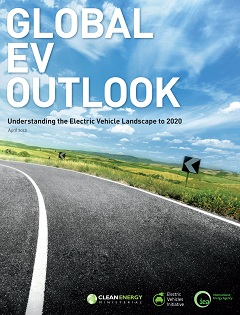17 April 2013
 At the fourth Clean Energy Ministerial, the Electric Vehicles Initiative (EVI) released its first-ever Global EV Outlook. The report offers a unique global perspective on the burgeoning electric vehicle (EV) market, reviewing the deployment efforts of EVI's 15 member countries, which together accounted for more than 90% percent of global EV stock in 2012. The report also identifies important market trends and best practices that can help advance EVs worldwide.
At the fourth Clean Energy Ministerial, the Electric Vehicles Initiative (EVI) released its first-ever Global EV Outlook. The report offers a unique global perspective on the burgeoning electric vehicle (EV) market, reviewing the deployment efforts of EVI's 15 member countries, which together accounted for more than 90% percent of global EV stock in 2012. The report also identifies important market trends and best practices that can help advance EVs worldwide.
As countries seek to address future energy requirements in a rapidly growing and changing world, achieving sustainable transport has emerged as a vital mission. EVs, in particular, represent one of the most promising pathways to increased energy security and reduced emissions of greenhouse gases and other pollutants.
The Global EV Outlook finds that global EV passenger car sales more than doubled between 2011 and 2012, exceeding the 100,000 sales milestone last year. World EV stock now stands at more than 180,000 vehicles. However, this represents only 0.02% of total passenger car stock, underscoring the distance that vehicle electrification still has to go.
EVI member governments have already made substantial and consequential research, development, and demonstration (RD&D) investments in vehicle electrification, with USD 8.7 billion in collective spending since 2008. These efforts have helped reduce battery development costs by more than 50% in the last five years. Strong government support in EVI countries on both the supply and demand sides is also contributing to rising market penetration. Twelve out of 15 EVI countries offer financial support for vehicle purchases, and most employ a mix of financial and non-financial incentives (such as access to restricted highway lanes) to help drive adoption.
Of course, significant technological, financial, market, and policy challenges remain. These challenges are complex and will require a broad and coordinated effort among all relevant public and private stakeholders to address them. The Global EV Outlook presents an Opportunity Matrix that outlines several opportunities for governments and industry to accelerate the global scale-up of electric vehicles. It also identifies which sectors are best suited to take the lead in the areas of technology, finance, market, and policy.
EVI is helping to address these challenges through an ongoing policy dialogue among its member governments as well as robust private-sector engagement. EVI seeks to facilitate the global deployment of at least 20 million passenger car EVs, including plug-in hybrid and fuel cell electric vehicles, by 2020. EVI includes many of the most pioneering countries in electrification and thus represents a reliable bellwether for global EV readiness. Its members comprise 8 of the 10 largest vehicle markets in the world and are projected to account for 83% of EV sales between now and 2020.
Significant market transformation will likely unfold gradually over a number of years, thus requiring a healthy dose of patience for those anticipating a new era of clean transport. Yet the important achievements that the EV market has already made in the last few years provide a strong foundation for future growth.
###
Source: globenewswire.com
